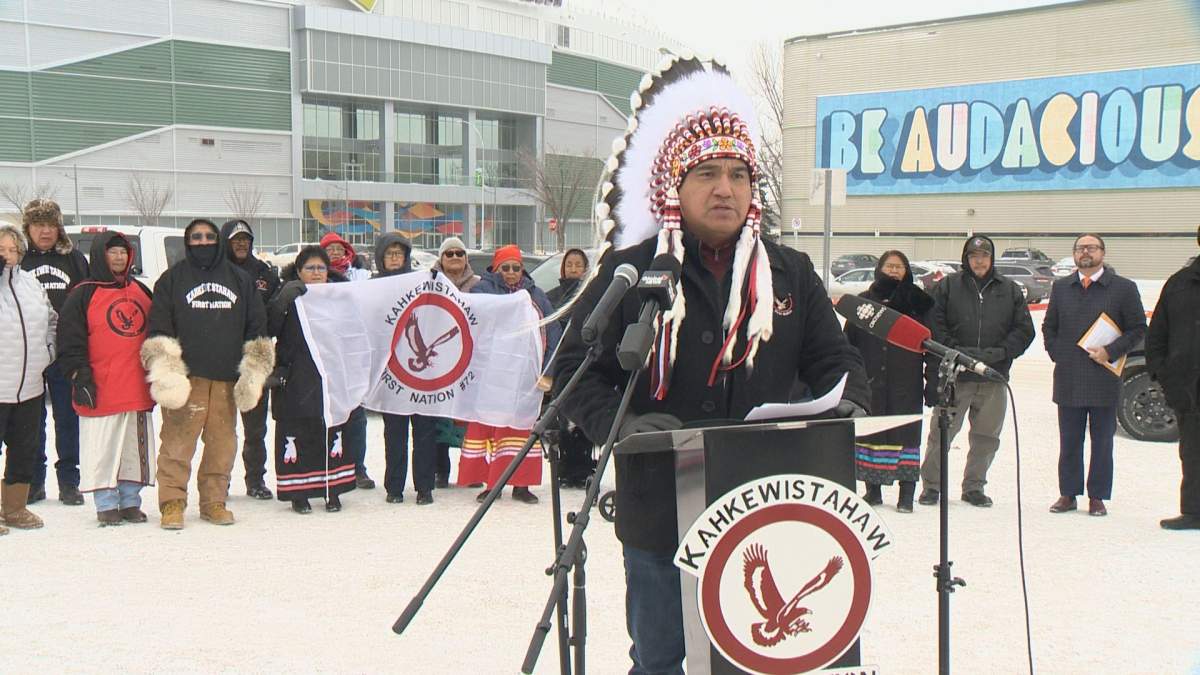Leadership and members of the Kahkewistahaw First Nation held a press conference in front of Mosaic Stadium to protest against the Florida based potash miner Mosaic Company for failing to engage and consult with the community.

Thursdsay morning, chief and members of the Kahkewistahaw First Nation stood in the chilly weather making a stand against Mosaic Potash and the Saskatchewan government on strengthening efforts on working together.
“Today I stand here frustrated, offended, slapped in the face,” said Chief Evan Taypotat. “Kahkewistahaw First Nation has built a business thinking we would be able to participate and employ our members and other surrounding First Nation workers through trades like welding and pipe fitting, and other trades only to be completely shut out.”
The First Nation owns a custom steel fabrication plan in Saskatchewan called Kihew Fab-Co Ltd. located in Melville which now sits empty, according to Chief Taypotat. He said his First Nation approached Mosaic Potash to supply work which he claims they refused.
“(A) million-dollar facility sits empty because Mosaic, ten kilometers from my First Nation, won’t give us work,” he said. “We don’t want free. We want to work for what we got.”
The Kahkewistahaw First Nation is located approximately 175 kilometers northeast of Regina.

Get breaking National news
The Chief was accompanied by several members of his band to speak their minds on wanting answers from Mosaic Potash and the provincial government. An elder from the Kahkewistahaw First Nation said the government has a duty to consult as was agreed in the treaties – to share this land the depth of the plow.
“For years, our people have lived under the thumb of the Indian Act. That didn’t allow us to grow,” said Sharon Green. “We’re still being held out. We’re still not allowed to thrive … the contracts that would help the economy of Saskatchewan, the contracts that would help the local businesses, where are they going? They’re not going to (Kihew Fab-Co). They’re not going to Kahkewistahaw. They’re not going to Ochapowace. They’re going elsewhere.”
In a release, Malcolm Macpherson, who represents Kahkewistahaw, stated the company has refused to meaningfully engage with the Kahkewistahaw First Nation.
“Potash extraction by Mosaic at the expense of Kahkewistahaw is all done under the watch of Premier Scott Moe’s government, which is poised to introduce The Saskatchewan First Act,” stated Macpherson. “Premier Moe’s government says the legislation is designed to clearly define that Saskatchewan — and Saskatchewan alone — has the exclusive jurisdiction over its natural resources and economic future.”
In an emailed statement to Global News, Mosaic responded to concerns brought forward and said they understand Chief Taypotat’s frustration and said in the last two years, Mosaic had included Kahkewistahaw fabrication shop in 109 bids for work and that they have responded to three.
“After working closely with them, we did award them work in 2022 in the hopes that this would lead to a mutually beneficial and long-lasting relationship,” stated Sarah Fedorchuk, Mosaic vice-president of government and public affairs.
“On resource sharing, Mosaic will pay $1.2 billion in resource taxes and royalties to the Government of Saskatchewan in 2022 which is used for services for all of its citizens. This is far and away the most exhaustive resource tax regime in the world with our global competitors paying 40% less taxes than the Canadian potash producers.”
Mosaic added that they have made significant progress on all of their key pillars and are on track or exceeding the targets this year on Indigenous Engagement.
“The work we do with our Indigenous partners is key to our success and it is our hope that we can have a constructive and engaging relationship with all of the communities that surround our operations,” stated Mosaic.









Comments